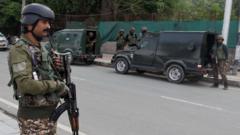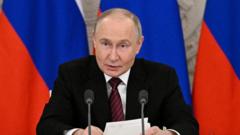The ceasefire marks a significant moment in the ongoing conflict between India and Pakistan, highlighting the need for diplomatic dialogue.
Ceasefire Achieved in India-Pakistan Conflict Amid Escalating Tensions

Ceasefire Achieved in India-Pakistan Conflict Amid Escalating Tensions
Historic agreement comes following intense military clashes and international mediation efforts.
Following four days of escalating military clashes, India and Pakistan have announced a ceasefire. This agreement, facilitated by US intervention, was disclosed via social media by US President Donald Trump who emphasized a “full and immediate ceasefire.” Nevertheless, reports from major cities in Indian-administered Kashmir, including Srinagar and Jammu, described ongoing explosions shortly after the declaration, with no official comments from either government.
The recent hostilities included a series of drone and missile strikes initiated by India, triggered by militant activities leading to tourist casualties in Kashmir. While India directly accused Pakistan of complicity, Pakistan vehemently denied any involvement. The region of Kashmir has been a longstanding point of contention between the two nuclear nations since their separation from Britain in 1947, leading to several military conflicts.
India's External Affairs Minister S. Jaishankar confirmed that both nations had reached an understanding to halt military actions. He reiterated India's unwavering commitment to combating terrorism. Meanwhile, Pakistan’s Deputy Prime Minister Ishaq Dar stressed the country's desire for peace while upholding its sovereignty.
International responses echoed a call for de-escalation, with China urging both nations to prioritize regional stability. Following the ceasefire news, US Secretary of State Marco Rubio announced plans for both countries to negotiate on various issues at a neutral venue. He highlighted his recent discussions with the Indian and Pakistani leadership alongside US Vice-President JD Vance.
United Nations Secretary-General Antonio Guterres also welcomed the ceasefire as a positive step towards reducing tensions. The UK’s Prime Minister, Sir Keir Starmer, acknowledged Britain’s involvement in mediation efforts, stating that ensuring the ceasefire's durability is vital.
The military engagement arose amid escalating violence sparked by a deadly attack in April, where 26 tourists lost their lives in a targeted assault in Pahalgam, Kashmir. Survivors alleged that militants specifically targeted Hindu individuals. In retaliation, India conducted what it termed necessary strikes, asserting a responsibility to hold attackers accountable, whereas Pakistan labeled these assaults as unprovoked aggressions.
Casualty reports have been harrowing, with Pakistan attributing up to 36 deaths due to Indian actions while India reported at least 21 civilian fatalities from cross-border shelling. The recent surge in hostilities included accusations from both nations of targeting military facilities. The volatile situation reflects the critical need for dialogue to ensure lasting peace in the region.




















